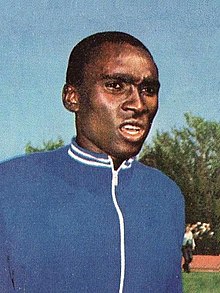 John Akii-Bua c. 1972 John Akii-Bua c. 1972 | |||||||||||||||||||||
| Personal information | |||||||||||||||||||||
|---|---|---|---|---|---|---|---|---|---|---|---|---|---|---|---|---|---|---|---|---|---|
| Born | 3 December 1949 Lira, Uganda | ||||||||||||||||||||
| Died | 20 June 1997 (aged 47) Kampala, Uganda | ||||||||||||||||||||
| Height | 1.88 m (6 ft 2 in) | ||||||||||||||||||||
| Weight | 77 kg (170 lb) | ||||||||||||||||||||
| Sport | |||||||||||||||||||||
| Sport | Athletics | ||||||||||||||||||||
| Event(s) | 400 m, 400 m hurdles | ||||||||||||||||||||
| Achievements and titles | |||||||||||||||||||||
| Personal best(s) | 400 m – 45.82 (1976) 400 mH – 47.82 (1972) | ||||||||||||||||||||
Medal record
| |||||||||||||||||||||
John Akii-Bua (3 December 1949 – 20 June 1997) was a Ugandan hurdler and the first Olympic champion from his country Uganda. In 1986, he was a recipient of the Silver Olympic Order.
Biography
Akii-Bua was raised in a family of 43 children from one father and his eight wives. Akii-Bua started his athletic career as a short-distance hurdler, but failed to qualify for the 1968 Olympics. Coached by British-born athletics coach Malcolm Arnold, he was introduced to the 400 meter hurdles. After finishing fourth in the 1970 Commonwealth Games and running the fastest time of 1971, he was not a big favourite for the 1972 Summer Olympics in Munich, having limited competitive experience. Nevertheless, he won the final there, setting a world record time of 47.82 seconds despite running on the inside lane. He missed the 1976 Olympics and a showdown with United States rival Edwin Moses because of the boycott by Uganda and other African nations.
As a police officer, Akii-Bua was promoted by Ugandan president Idi Amin and given a house as a reward for his athletic prowess. When the Amin regime was collapsing, he fled to Kenya with his family, fearful that he would be seen as a collaborator; this was more likely because he was a member of the Langi tribe, many of whom were persecuted by Amin, whereas Akii-Bua was cited by Amin as an example of a Langi who was doing well. However, in Kenya he was put into a refugee camp. From there, he was freed by his shoe-manufacturer Puma and lived in Germany working for Puma for 3–4 years. He represented Uganda once again at the 1980 Summer Olympics. Later he returned to Uganda and became a coach.
Akii-Bua died a widower, at the age of 47, survived by eleven children. He was given a state funeral. His nephew is international footballer David Obua, and his brother Lawrence Ogwang competed in the long jump and triple jump at the 1956 Olympics.
The phrase "akii-buas" has come to colloquially mean "runs" in Uganda.
References
- "Uganda to remember Olympic hurdler John Akii Bua". World Athletics. Retrieved 19 August 2021.
- "John Akii-Bua". Olympedia. Retrieved 3 December 2021.
- "Personalities at Olympics: Akii-Bua the Best in Vest". The New York Times. 4 September 1972. pp. 10 Section: Sports.
He is one of a family of 43 children. His father had eight wives.
- ^ John Akii-Bua Archived 22 July 2015 at the Wayback Machine. sports-reference.com
- ^ IAAF, 5 June 2008: Inzikuru to return to action in Akii Bua CAA Grand Prix
- "John Akii-Bua, 47 Is Dead; Ugandan Won Olympic Gold". The New York Times. 25 June 1997. p. D20.
Amin was purging the Lango tribe, and Akii-Bua was Lango
- The John Akii-Bua Story: an African Tragedy, documentary by Dan Gordon, BBC2, 10 August 2008
- Tim Crothers (9 October 2012). The Queen of Katwe: A Story of Life, Chess, and One Extraordinary Girl's Dream of Becoming a Grandmaster. Scribner. ISBN 9781451657814.
External links
| Sporting positions | ||
|---|---|---|
| Preceded by |
Men's 400 m Hurdles Best Year Performance 1972 – 1973 |
Succeeded by |
| Olympic champions in men's 400 metres hurdles | |
|---|---|
|
| African Games champions in men's 400 metres hurdles | |
|---|---|
|
- 1949 births
- 1997 deaths
- Ugandan male hurdlers
- Commonwealth Games competitors for Uganda
- Athletes (track and field) at the 1970 British Commonwealth Games
- Olympic athletes for Uganda
- Athletes (track and field) at the 1972 Summer Olympics
- Athletes (track and field) at the 1980 Summer Olympics
- Olympic gold medalists for Uganda
- World record setters in athletics (track and field)
- Ugandan police officers
- Medalists at the 1972 Summer Olympics
- Olympic gold medalists in athletics (track and field)
- African Games gold medalists for Uganda
- African Games medalists in athletics (track and field)
- African Games silver medalists for Uganda
- Athletes (track and field) at the 1973 All-Africa Games
- Athletes (track and field) at the 1978 All-Africa Games
- Recipients of the Olympic Order
- Sportspeople from Northern Region, Uganda